
This parent guide supports parents in helping their child at home with the 8th grade Social Studies content.
- Subject:
- Social Studies
- Material Type:
- Reference Material
- Vocabulary
- Author:
- Kelly Rawlston
- Letoria Lewis
- Date Added:
- 10/12/2022

This parent guide supports parents in helping their child at home with the 8th grade Social Studies content.

This resource accompanies our Rethink 8th Grade Social Studies course. It includes ideas for use, ways to support exceptional children, ways to extend learning, digital resources and tools, tips for supporting English Language Learners and students with visual and hearing impairments. There are also ideas for offline learning.
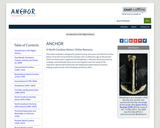
This online textbook is designed for grade 8 and up and covers all of North Carolina history, from the arrival of the first people some 12,000 years ago to the present. There are eleven parts, organized chronologically, a collection of primary sources, readings, and multimedia that can be rearranged to meet the needs of the classroom. Special web-based tools aid reading and model historical inquiry, helping students build critical thinking and literacy skills.

Students will read and analyze historical documents and answer a series of questions based on their analysis.

In this lesson, students will compare/contrast the information in their textbook about Andrew Jackson to political cartoons of the era. Students will identify symbols, allusions and stereotypes used in these cartoons and infer the intended message and tone of the Jackson era cartoons. Students will also identify any biases in the cartoons and check for historical accuracy, and then formulate their own opinion about the Jackson Administration. As a culminating activity, students will write an opinion essay that articulates their personal stance on Andrew Jackson’s character, using proper writing conventions.
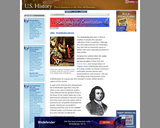
This resource provides details about Antifederalists and their role in the ratifying of the Constitution.

Students compare their state's constitution to the U.S. Constitution, explain how the two documents illustrate federalism, and evaluate the need for state constitutions.
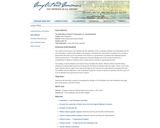
Students will determine the best way to govern by analyzing the writings of the Federalists and Anti-Federalists and apply their ideas during a Socratic Seminar.
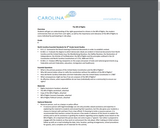
Students will gain an understanding of the rights guaranteed to citizens in the Bill of Rights, the modern
controversies that can arise from such rights, as well as the importance and relevance of the Bill of Rights to
every individual by participating in role-plays.

In this lesson, students will explain some of the issues faced by the delegates at the Constitutional Convention and describe how different states addressed these issues. Students will also be able to describe how the outcomes of the simulated Constitutional Convention compares to the outcomes of the actual event.
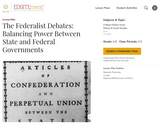
This lesson focuses on the debates among the U.S. Founders surrounding the distribution of power between states and the federal government. Students learn about the pros and cons of state sovereignty vs. federalism and have the opportunity to argue different sides of the issue.
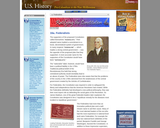
This resource provides details about Federalists and their support of the Constitution.

Students will explore the Articles of Confederation and the Articles' influence in revising the Constitution of 1787. Students will experience the sentiments of Federalists and Anti Federalists by participating in a partner debate as either North Carolina Federalist James Iredell or Anti Federalist Willie Jones.

Students will analyze a letter from President George Washington to the Governor of North Carolina regarding the state"™s stance on the new Constitution. They will then participate in a mock convention/debate to better understand the issues involved in ratifying the document. Finally the students will pretend they were at the Constitutional Convention as a reporter. The culminating activity will require the students to create a newspaper reporting on the various viewpoints of the Convention in a time-accurate periodical.

This lesson explores the Federalist Papers. First, students engage in a discussion about how they get information about current issues. Next, they read a short history of the Federalist Papers
and work in small groups to closely examine the text. Then, each small group presents its ideas to the class as a catalyst for further, large-group discussion. Finally, students work in small groups to research a Federalist or Anti-Federalist and role-play this person in a classroom debate on the adoption of the Constitution. Writing activities follow that allow students to use their understanding of the history and significance of the Federalist Papers.

This video re-enactment portrays Thomas Jefferson and Alexander Hamilton debating issues of scope and power of the state and national governments.
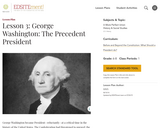
George Washington became President"”reluctantly"”at a critical time in the history of the United States. The Confederation had threatened to unravel; the weak central government (which included a weak executive with the sole responsibility of presiding over meetings of Congress and no special power to initiate laws beyond that of any member of Congress, enforce laws, or check acts of Congress) created by the Articles of Confederation had failed.

Students will explore the personalities of the Revolutionary War's Patriots and Loyalists by participating in a character role play. The lesson will culminate with students researching and writing a character sketch of a key Revolutionary figure of their choice and participating in a Colonial Town Hall & Debate.

The protocols and resources in this appendix to Grades 6-8 EL Education Curriculum are referenced in the lessons and are related to checking for understanding, formative assessment, and building academic vocabulary.
Protocol descriptions include:
Final Word
Gallery Walk
Interactice Word Wall
Rank, Talk, Write
Say Something

After reading narratives from former slaves that were recorded in the 1930's as part of the Federal Writers' Project, students conduct research on slavery and tell a story based on their findings. The lesson incorporates an exploration of storytelling techniques.